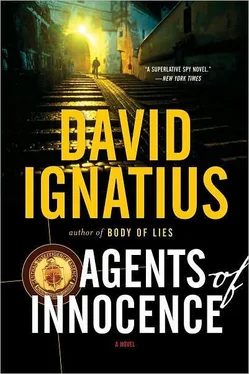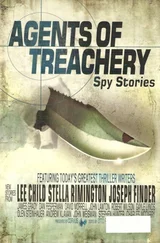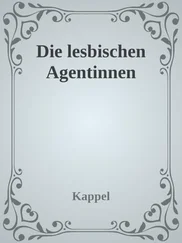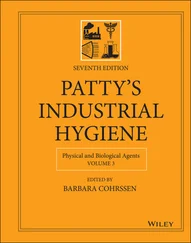David Ignatius - Agents of Innocence
Здесь есть возможность читать онлайн «David Ignatius - Agents of Innocence» весь текст электронной книги совершенно бесплатно (целиком полную версию без сокращений). В некоторых случаях можно слушать аудио, скачать через торрент в формате fb2 и присутствует краткое содержание. Жанр: Шпионский детектив, на английском языке. Описание произведения, (предисловие) а так же отзывы посетителей доступны на портале библиотеки ЛибКат.
- Название:Agents of Innocence
- Автор:
- Жанр:
- Год:неизвестен
- ISBN:нет данных
- Рейтинг книги:3 / 5. Голосов: 1
-
Избранное:Добавить в избранное
- Отзывы:
-
Ваша оценка:
- 60
- 1
- 2
- 3
- 4
- 5
Agents of Innocence: краткое содержание, описание и аннотация
Предлагаем к чтению аннотацию, описание, краткое содержание или предисловие (зависит от того, что написал сам автор книги «Agents of Innocence»). Если вы не нашли необходимую информацию о книге — напишите в комментариях, мы постараемся отыскать её.
Agents of Innocence — читать онлайн бесплатно полную книгу (весь текст) целиком
Ниже представлен текст книги, разбитый по страницам. Система сохранения места последней прочитанной страницы, позволяет с удобством читать онлайн бесплатно книгу «Agents of Innocence», без необходимости каждый раз заново искать на чём Вы остановились. Поставьте закладку, и сможете в любой момент перейти на страницу, на которой закончили чтение.
Интервал:
Закладка:
The first person on the CIA payroll to notice anything peculiar was Fuad. He had maintained sporadic contact with Jamal ever since the disastrous meeting with Marsh the previous summer in Rome. At one of these infrequent meetings with Jamal in mid-1971-arranged simply as a reminder that the Americans were still in the game-Fuad sensed that something had changed in Jamal. The freewheeling playboy had turned serious. The question was why.
The meeting took place in a coffeehouse in Fakhani late on a Thursday afternoon, the start of the Moslem weekend and the traditional boys’ night out in the Arab world. In the old days, Fuad and Jamal had often met on Thursday evenings for coffee, then whisky, then food, then women.
Fuad arrived late, looking sleek in a pair of wraparound sunglasses. He greeted people in the coffeehouse. They smiled and called his name. Fuad was, by now, a regular in the Fatah-controlled neighborhood of Fakhani. Everyone knew him. He was a rich Lebanese leftist, a friend of the Revolution.
Jamal was already there waiting, smoking a cigarette with one hand and drumming his fingers on the table with the other. He looked tired and overworked, with deep circles under his eyes. The young Palestinian scolded Fuad for being several minutes late. He glanced frequently at his wristwatch.
“You’re behaving more like an American than an Arab,” said Fuad jokingly after a few minutes of desultory conversation.
“And what is wrong with that?” answered Jamal. “There is much that we could learn from the Americans.”
“There is?” asked Fuad, unable to mask his surprise.
“We need help! Sometimes when I watch my Arab brothers, I think maybe we should contract the Revolution out to the Americans. Or the Germans. Or even the Swiss!”
Fuad laughed. But he wondered: What is Jamal telling me? Why is he so tense?
“Do you know what the Arab national slogan should be?” asked Jamal.
“What?”
“ ‘Fut aleina bukra’,” said Jamal. Stop by tomorrow! It was a favorite expression of the time-wasting Egyptians, an Arabic equivalent of manana.
“What is keeping you so busy these days?” asked Fuad.
“Administrative work.”
“What kind?”
“Paperwork,” answered Jamal wearily. “The Old Man asked me to help with the finances. The Martyrs’ Funds. Investments. Money from the Saudis and the Kuwaitis.”
“A lot of money?” asked Fuad.
“Millions,” said the Palestinian. “Tens of millions. The Revolution is rich. But the work isn’t very interesting. It is bank accounts and deposit slips and paperwork. I find it dull.”
“Bureaucracy is the curse of the Arabs,” said Fuad.
“You are wrong, my friend,” answered Jamal. “The curse of the Arabs is the Arabs.”
Fuad looked at him curiously.
“You said before that you need help. Do you mean it?”
“From who?”
“From my friends.”
Jamal laughed. Was he thinking of Marsh and the look on his face as a briefcase of hundred-dollar bills tumbled at his feet? The Palestinian lowered his voice and spoke to Fuad.
“I don’t ever want to see your American friends again. And I warn you: If they come after me, I will kill them.”
Fuad nodded. He changed the subject. What did Jamal think of the new Lebanese cabinet? It was a joke, a scandal. Everyone was for sale. Fatah probably had more Lebanese on the payroll than did the Lebanese Ministry of Interior. And the Sunni politicians in West Beirut, they no longer even pretended to be independent. They just did what Fatah instructed. Lebanon would be better off if it was run entirely by the Palestinians! They drank a friendly toast to the Revolution. A few minutes later Jamal broke off the meeting. He had a headache, he said. They would meet again in a few months.
Fuad watched Jamal walk away toward one of the anonymous apartments in Fakhani where he now stayed when he was in Beirut. It was useless to try to follow. Worse than useless. It was suicidal.
The next day Fuad sent a message to Rogers. He left it in the drop at the Souk Tawile.
Fuad’s message was simple but inconclusive: Our old friend is up to something. He is telling transparent lies about his activities, but that is to be expected. What is strange is the way he looks. He is tired and tense. His eyes say that something is different. He is angry. He talks of killing Americans, but I don’t believe it. Watch him if you can, because I think he is going underground.
But there was nobody to do the watching. The Beirut station had lost two diplomatic cover slots and 10 percent of its budget. The Middle East was on the back burner again. The war in Indochina was taking up more and more of the agency’s resources. There was no time or money to mount a new surveillance operation against a Palestinian intelligence officer simply because a Lebanese contract agent thought that he looked tired and tense.
Rogers received a peculiar call in midsummer from Father Maroun Lubnani. Peculiar, Rogers thought, because they had not seen each other in months.
The Maronite priest invited Rogers to join him for a walk in the hills above Kaslik. It would be a chance to talk, he said. Rogers, dressed in tennis shoes and blue jeans, arrived at the gate of the University of the Holy Ghost at the appointed hour. He was surprised to see Father Maroun waiting at the gate, dressed in a full Alpinist’s uniform of lederhosen, kneesocks, and a Tyrolean hat. The priest was sitting unsteadily on the silver perch of his walking stick.
Rogers tried to think of something to say about this outlandish costume that wouldn’t sound insulting. Nothing occurred to him, so he kept his mouth shut.
Father Maroun greeted him stiffly in French.
The American intelligence officer and the Lebanese priest set off in tandem up the steep slopes of Kesrouan. The priest, though bulky as ever, was surprisingly agile. He seemed to enjoy clambering up the trail at high speed and then pausing to wait for the American to catch up. They climbed for nearly an hour. Father Maroun led Rogers across a mountain stream, along a narrow ledge, through a dense stand of pine trees, and then into a clearing that was completely hidden from below. It was a high meadow, covered with the softest, greenest grass. Below was the university, the seacoast, and the blue Mediterranean.
Father Maroun stopped and flipped open his walking stick. Rogers sat down on the grass and lit a Marlboro. The priest, to Rogers’s surprise, took a pack of Camels from his leather shorts.
“I didn’t know you smoked, Father,” said Rogers.
“All Lebanese smoke,” said the priest.
They sat there, the priest on his walking stick and Rogers on his haunches, smoking their cigarettes and gazing at the matchless beauty of the Lebanese mountains in midsummer.
“This is magnificent,” said Rogers.
The priest looked at him and nodded solemnly.
“You must remember this,” Father Maroun said, “when you are wondering to yourself someday: What are those crazy Lebanese fighting about?”
Rogers nodded. He wondered whether he was in for another recitation of the torment and triumph of the Maronite Church.
“When you called me, Father, you said that you had something you wanted to discuss.”
“Oh yes,” said the priest. “I do indeed. Most definitely.”
He waited for the priest to begin. When he didn’t, he prodded him.
“Well, what was it?”
“What?”
“What you wanted to ask me.”
“Ah yes, of course,” said the priest. “What I wanted to ask you was, what do you think about the leadership of the Palestinian guerrilla group, Al-Fatah?”
That’s an odd question for a Maronite priest to be asking me, thought Rogers.
“That depends on who you are talking about,” he replied. “Some of the Fatah men strike me as dishonest braggarts. Others strike me as sincere. Some are intelligent and others are fools. From what I can gather, most of them are corrupt.”
Читать дальшеИнтервал:
Закладка:
Похожие книги на «Agents of Innocence»
Представляем Вашему вниманию похожие книги на «Agents of Innocence» списком для выбора. Мы отобрали схожую по названию и смыслу литературу в надежде предоставить читателям больше вариантов отыскать новые, интересные, ещё непрочитанные произведения.
Обсуждение, отзывы о книге «Agents of Innocence» и просто собственные мнения читателей. Оставьте ваши комментарии, напишите, что Вы думаете о произведении, его смысле или главных героях. Укажите что конкретно понравилось, а что нет, и почему Вы так считаете.












